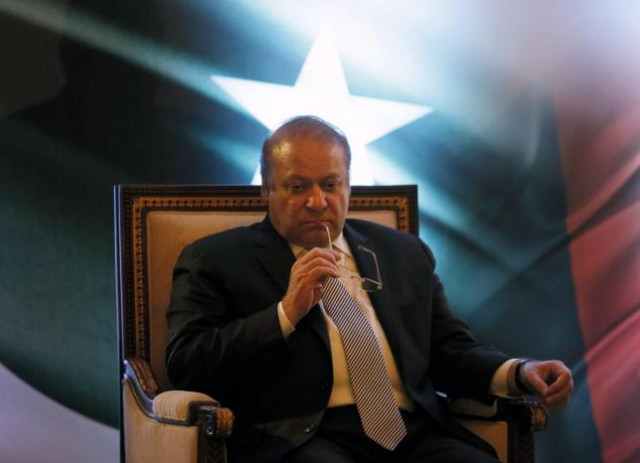Attorney admits omissions in Nawaz’s NA speech
Says the PM neither beneficiary nor a director in any of his sons’ businesses

Pakistani Prime Minister Nawaz Sharif looks on during a lecture on Sri Lanka-Pakistan Relations in Colombo, Sri Lanka January 5, 2016. REUTERS/Dinuka Liyanawatte
The PM’s new counsel Makhdoom Ali Khan has come up with a new strategy before the SC’s five-judge larger bench hearing the Panamagate case.
Disqualification of PM to set a dangerous precedent: SC
Khan is not giving submissions for justifying the money trail and his only focus is to clarify the PM’s position regarding his alleged contradictory statements about ownership of his family’s London flats.
Resuming his arguments on Thursday, the counsel said the PM was neither a beneficiary nor a director in any of his sons’ businesses. “No principle of law can hold the premier answerable for his sons’ businesses,” he said.

Regarding Nawaz’s allegedly contradictory statements, Khan contended that the PM just gave an overview of his sons’ businesses in his speech, wherein there were certain omissions but there is no lie [false statements].
“Is every omission a suppression and every inadvertent [omission] a lie?” he asked. However, head of the bench Justice Asif Saeed Khosa asked, “Is that (omission) half-lie or half-truth?”
PM not answerable for son's business: counsel
Khosa also observed that the PM claimed in his speech that all record of money trail was available but he did not give any reference about the Qatari investment. “There is nothing on record that the PM has no connection with his son’s business,” he added.
Justice Ejaz Afzal Khan asked whether it was an innocent omission or an intended one.
Referring to Article 66 of the Constitution, he also questioned what would be the implication of this article, when the court would decide about the question of the PM’s speech in parliament. Article 66 of the Constitution says parliament’s proceedings cannot be challenged in any court of law.
Another judge Justice Ijaz ul Ahsan remarked that the premier’s speech was a written document that must be duly deliberated before being delivered as speech. “We have yet to receive any documentary record to substantiate your submissions. These are inquisitorial proceedings in Panamagate case, wherein the court is required to dig out and examine the facts,” he added.
SC says does not need consent to form judicial commission
The judges also discussed whether the circumstantial evidences could be considered for reaching the truth in Panamagate case.
Justice Khosa referred to the specific Article of Qanoon-i-Shahadat Act 1984 and observed that the court can examine the circumstantial material for finding out the truth. However, Justice Sheikh Azmat Saeed observed that: “We cannot record the evidence in this matter.”
Justice Ejaz Afzal Khan said this was a unique case. “We are walking a tightrope and we have to take every step with care. We don’t want to leave any aspect of the case unaddressed.”
When Makhdoom Ali Khan referred to disqualification of lawmaker under the Representation of People’s Act 1976 (Ropa), Justice Khan observed that Ropa is not applicable in this matter.
Justice Saeed said writ of Quo Warranto is applicable in such matters, which arises post-election. Another judge pointed out that the Supreme Court while exercising jurisdiction under Article 184 (3) of the Constitution had disqualified parliamentarians’ in Mahmood Akhtar Naqvi case.
Panamagate scandal: Nawaz, Zardari expected to meet soon
On the bench’s query, the PM’s counsel said a case of similar nature was pending in the Lahore High Court as well as the Election Commission of Pakistan (ECP). Upon this, Justice Khan asked if it was appropriate for the SC to continue parallel proceedings.
Justice Khosa, however, observed that there are precedents, wherein the Supreme Court summoned the record of cases pending from the high court and adjudicated itself.
When the counsel told the bench that the premier in his speech said his life was like an open book Justice Khosa, in a lighter vein, observed that: “Some pages of this book seem to be missing.”
Justice Saeed remarked that everyone wanted to find out the truth but no parties wanted to reveal it. The PM’s counsel contended that there were contradictions in the PTI’s petition and their lawyer’s oral submissions regarding the Gulf Steel Mills. The hearing of case is adjourned till today (Thursday).
Published in The Express Tribune, January 13th, 2017.


















COMMENTS
Comments are moderated and generally will be posted if they are on-topic and not abusive.
For more information, please see our Comments FAQ